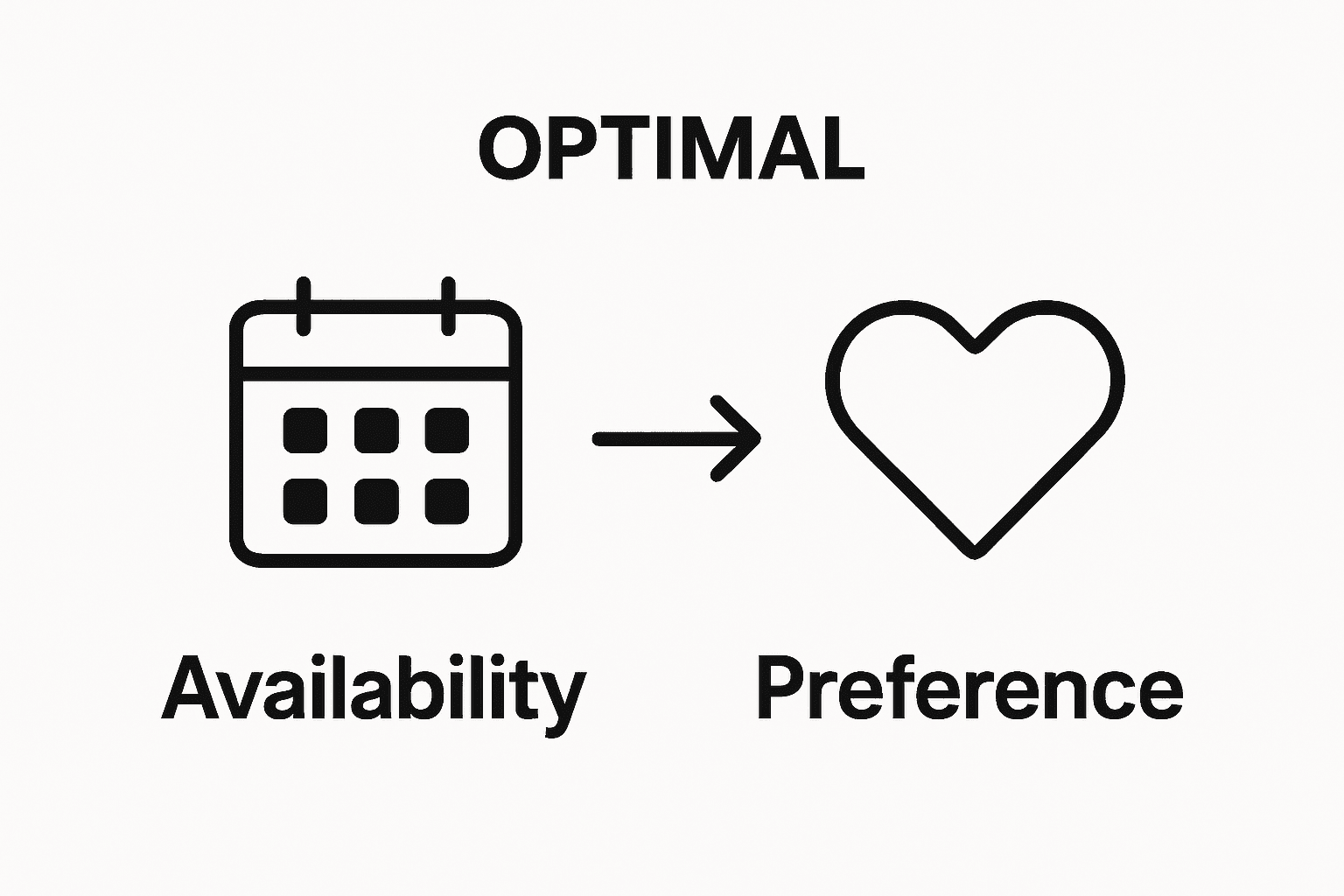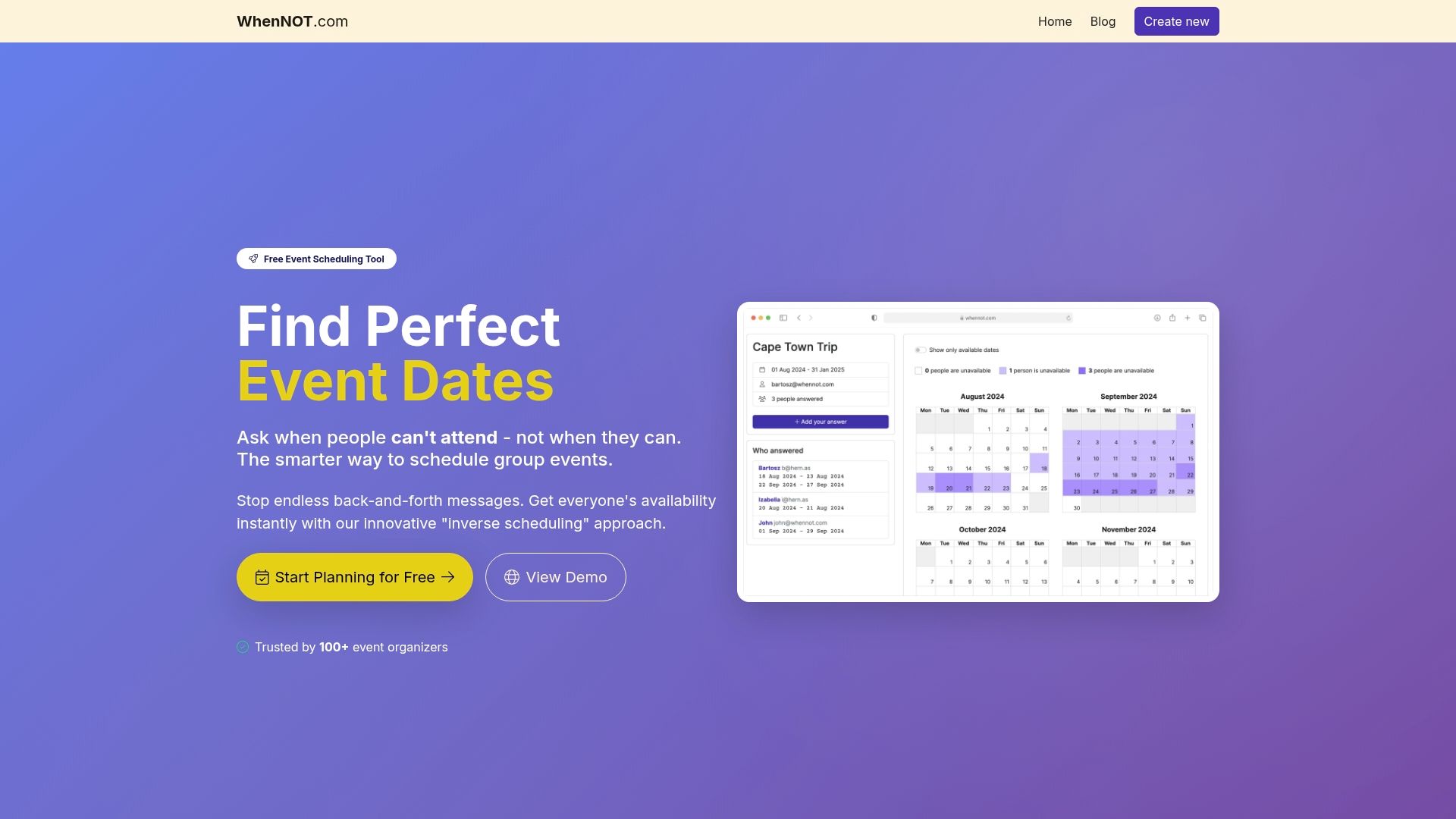Trying to get a group of people to agree on a meeting time can feel impossible. On average, teams spend over 30 minutes just finding a single meeting slot, according to studies. Most would expect advanced tools to have solved this hassle by now. The real surprise is that group scheduling is more than just finding open calendar dates. It is a strategic skill that shapes productivity, harmony, and even team happiness in unexpected ways.
Table of Contents
- What Is Group Scheduling And Why Is It Important?
- Key Concepts In Group Scheduling: Availability And Preferences
- How Technology Enhances Group Scheduling Processes
- Practical Applications Of Group Scheduling In Various Contexts
- Real-World Challenges And Solutions In Group Scheduling
Quick Summary
| Takeaway | Explanation |
|---|---|
| Streamlined scheduling boosts efficiency. | Efficient scheduling tools reduce time spent on organizing meetings, allowing teams to focus on important work. |
| Respect individual availability and preferences. | Understanding personal constraints and working styles improves participation and increases engagement during group meetings. |
| Leverage technology for intelligent scheduling. | Advanced algorithms and automation enhance the scheduling process, making it easier and faster to coordinate events. |
| Address interpersonal dynamics in scheduling. | Acknowledging different communication preferences and priorities helps mitigate conflicts and improves collaboration. |
| Utilize group scheduling across various contexts. | Group scheduling is beneficial in professional, personal, and community settings, facilitating seamless organization and coordination. |
What is Group Scheduling and Why is it Important?
Group scheduling transforms how teams, organizations, and social groups coordinate events, meetings, and activities by simplifying the complex process of finding mutually convenient times. This strategic approach goes beyond individual calendar management, focusing on collective availability and collaborative planning.
Understanding Group Scheduling Dynamics
At its core, group scheduling solves a fundamental challenge: coordinating multiple people's schedules efficiently. Traditional methods like endless email chains, text message threads, and manual calendar comparisons consume significant time and create unnecessary communication friction. Research from the Computer Supported Cooperative Work journal reveals that effective scheduling tools can dramatically improve coordination, with 90% of participants expressing desire for streamlined scheduling processes.
Group scheduling involves several critical components:
- Collecting availability from multiple participants
- Identifying optimal meeting windows
- Minimizing scheduling conflicts
- Reducing communication overhead
- Ensuring transparent and fair time selection
The Strategic Importance of Efficient Scheduling
Effective group scheduling is not merely a logistical task but a strategic organizational capability. It directly impacts productivity, communication quality, and team collaboration. When scheduling processes are smooth, teams spend less time negotiating meeting times and more time on meaningful work.
Key benefits include:
- Reduced administrative burden
- Increased meeting participation rates
- Enhanced team communication
- Better time management across organizations
Whether coordinating a complex corporate retreat, planning a family reunion, or organizing a community event, group scheduling tools provide a structured approach to navigating the intricate landscape of collective time management. By leveraging technology and smart algorithms, these solutions transform what was once a frustrating process into a seamless, efficient experience.
Key Concepts in Group Scheduling: Availability and Preferences
Group scheduling centers on understanding and reconciling individual availability and personal preferences, transforming complex coordination challenges into manageable processes. This nuanced approach recognizes that scheduling is not just about finding shared time slots but also about respecting individual constraints and working styles.
Decoding Individual Availability
Availability represents more than just free time on a calendar. It encompasses a holistic view of a person's potential engagement, including work commitments, personal obligations, energy levels, and preferred working hours. Research from the University of California, San Francisco demonstrates that advanced scheduling systems allow individuals to specify detailed preferences, enabling more sophisticated and personalized scheduling approaches.
Key elements of individual availability include:
- Primary work hours and contractual commitments
- Personal time constraints
- Energy and productivity peaks
- Geographic and logistical considerations
- Potential time zone differences
Understanding Scheduling Preferences
Preferences go beyond mere availability, reflecting individual working styles, comfort zones, and optimal performance conditions. These nuanced factors can significantly impact group productivity and participant engagement. A well-designed scheduling approach considers not just when someone can attend, but how they prefer to engage.
Significant preference considerations include:
- Preferred meeting times
- Communication and interaction styles
- Technological comfort and access
- Personal work rhythm and productivity cycles
- Potential accommodation needs
By integrating both availability and preferences, group scheduling transforms from a mechanical process of finding overlapping time slots into a more empathetic, human-centered approach.
 This method acknowledges that successful collaboration depends not just on logistical alignment but on understanding and respecting individual working dynamics.
This method acknowledges that successful collaboration depends not just on logistical alignment but on understanding and respecting individual working dynamics.
How Technology Enhances Group Scheduling Processes
Technology has revolutionized group scheduling, transforming complex coordination challenges into streamlined, intelligent processes that save time, reduce miscommunication, and optimize collective productivity. Modern scheduling solutions leverage advanced algorithms, artificial intelligence, and intuitive design to simplify what was once a frustrating manual task.
Intelligent Automation in Scheduling
Intelligent scheduling technologies go beyond simple calendar comparison, utilizing sophisticated machine learning techniques to predict and suggest optimal meeting times. Research from the Calendar.help system demonstrates how structured workflows and automated processes can dramatically reduce the cognitive load associated with scheduling, breaking down complex coordination tasks into manageable, automated steps.
Key technological capabilities include:
- Automatic time zone conversion
- Real-time availability tracking
- Conflict detection and resolution
- Predictive scheduling recommendations
- Seamless integration with multiple calendar platforms
Advanced Features of Modern Scheduling Tools
Today's scheduling technologies offer far more than basic time slot matching. They incorporate complex decision-making algorithms that consider multiple variables such as participant preferences, historical meeting patterns, and organizational constraints. These tools can analyze communication styles, predict optimal meeting durations, and even suggest alternative collaboration methods when direct synchronous meetings prove challenging.
Significant technological enhancements encompass:
- Machine learning-powered scheduling suggestions
- Natural language processing for meeting descriptions
- Contextual availability interpretation
- Privacy-preserving coordination mechanisms
- Intelligent conflict resolution strategies
By transforming scheduling from a manual, time-consuming process to an intelligent, automated experience, technology empowers teams to focus on meaningful collaboration rather than logistical negotiations. The future of group scheduling lies in creating increasingly sophisticated, human-centric tools that understand and adapt to the nuanced complexities of human interaction and organizational dynamics.
Practical Applications of Group Scheduling in Various Contexts
Group scheduling transcends traditional workplace settings, offering transformative solutions across diverse domains. From professional environments to personal and community contexts, these strategies enable seamless coordination and efficient collaboration among multiple participants with complex scheduling requirements.
Professional and Organizational Contexts
In professional settings, group scheduling becomes a critical organizational capability that supports strategic planning and operational efficiency. Teams can synchronize workflows, coordinate cross-departmental projects, and optimize resource allocation through intelligent scheduling approaches. Research from the healthcare sector demonstrates how sophisticated scheduling can reduce wait times, improve service delivery, and enhance multidisciplinary team coordination.
Key professional applications include:
- Executive leadership team meetings
- Project management coordination
- Interdepartmental collaboration sessions
- Training and professional development programs
- Remote and hybrid workforce synchronization
Personal and Community Group Scheduling
Beyond corporate environments, group scheduling plays a pivotal role in managing personal and community interactions. Family reunions, volunteer organizations, hobby groups, and social clubs can leverage scheduling technologies to simplify event planning and maximize participation. These tools help individuals coordinate complex social dynamics with unprecedented ease and precision.
Significant personal and community scheduling scenarios involve:
- Family gathering and vacation planning
- Community event organization
- Sports team and recreational group coordination
- Academic study groups and collaborative learning
- Nonprofit and volunteer organization management
Group scheduling represents more than a technological convenience. It is a powerful mechanism for bridging communication gaps, respecting individual constraints, and creating shared experiences across diverse contexts. By providing flexible, intelligent coordination tools, these approaches empower groups to transform potential scheduling challenges into opportunities for meaningful collaboration.

Real-World Challenges and Solutions in Group Scheduling
Group scheduling represents a complex landscape of human interactions, technological capabilities, and organizational dynamics. While scheduling tools promise efficiency, real-world implementation reveals nuanced challenges that require sophisticated, adaptive solutions across diverse contexts.
Complex Interpersonal Scheduling Dynamics
Scheduling interactions involve more than simply matching available time slots. They require navigating intricate human preferences, communication styles, and psychological barriers. Research from Frontiers in Psychology highlights the psychological dimensions of group scheduling, emphasizing the need for platforms that respect individual priorities and reduce interpersonal friction.
Primary interpersonal scheduling challenges include:
- Conflicting personal and professional priorities
- Varying communication preferences
- Power dynamics within groups
- Unequal negotiation capabilities
- Psychological resistance to compromise
Technological and Logistical Coordination Barriers
Beyond human factors, technological and logistical challenges significantly complicate group scheduling. Global teams, remote work environments, and increasingly flexible work arrangements introduce complex variables that traditional scheduling methods struggle to address. Multiple time zones, diverse technological infrastructures, and varying accessibility create substantial coordination obstacles.
Significant technological and logistical challenges encompass:
- International time zone discrepancies
- Technological access disparities
- Incompatible calendar systems
- Network connectivity limitations
- Device and platform variations
Successful group scheduling demands a holistic approach that balances technological innovation with human-centered design. By recognizing and proactively addressing these multifaceted challenges, organizations and individuals can transform scheduling from a potential source of frustration into a strategic collaboration tool that respects individual needs while achieving collective objectives.
Below is a summary table outlining the main interpersonal and technological challenges in group scheduling, along with strategies to address each one for more effective coordination.
| Challenge Type | Example Challenges | Typical Solutions |
|---|---|---|
| Interpersonal Dynamics | Conflicting priorities, power dynamics, negotiation gaps | Acknowledge preferences, balanced communication |
| Interpersonal Dynamics | Varying communication styles, resistance to compromise | Mediation, transparent scheduling, empathy |
| Technological/Logistical | Time zone discrepancies, incompatible systems | Automatic time zone conversion, integrative tools |
| Technological/Logistical | Technological access disparities, device variations | Inclusive platforms, cross-device compatibility |
| Technological/Logistical | Network connectivity limitations | Offline access, lightweight scheduling solutions |
Discover Effortless Group Scheduling with WhenNOT
Tired of endless back-and-forth emails and frustrating calendar comparisons? The article highlighted how traditional group scheduling drains your time and energy, especially when trying to respect everyone's availability and preferences. When multiple people are involved, collecting availability and minimizing scheduling conflicts often feels impossible. Missing the perfect date or juggling time zones can leave you feeling overwhelmed by communication hassles and planning burnout.

Take control of your planning process and experience a smarter way to schedule. WhenNOT uses an intuitive "inverse scheduling" approach, asking everyone to simply mark dates when they are NOT busy. This means you can instantly visualize everyone’s busy days, find the best meeting options, and finish planning in a fraction of the time. It is free to use, completely private, and requires no sign-ups or accounts for participants. Stop wasting effort and start planning smarter. Visit WhenNOT now to streamline your next group event and see firsthand how simple scheduling can be.
Frequently Asked Questions
What is group scheduling?
Group scheduling is the process of coordinating events, meetings, and activities for multiple participants by simplifying the search for mutually convenient times. It focuses on collective availability and collaborative planning.
Why is effective group scheduling important?
Effective group scheduling improves productivity, communication quality, and team collaboration. It minimizes scheduling conflicts, reduces administrative burden, and allows teams to spend more time on meaningful work rather than negotiating meeting times.
How does technology enhance group scheduling?
Technology enhances group scheduling by leveraging advanced algorithms and artificial intelligence to automate processes, predict optimal meeting times, and reduce miscommunication. Modern tools can track availability in real-time and suggest scheduling alternatives based on participant preferences.
What are the primary challenges of group scheduling?
The main challenges of group scheduling include navigating complex interpersonal dynamics, varying individual preferences, conflicting priorities, and logistical barriers such as time zone differences and technological access disparities.
